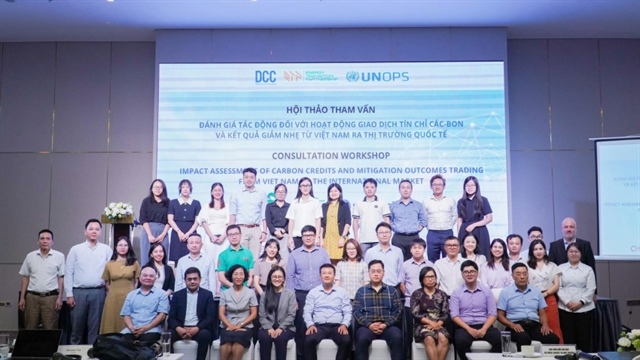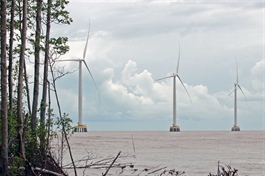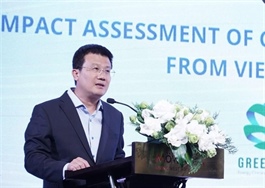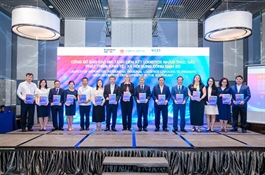Carbon market governance tightened to support global climate action
Carbon market governance tightened to support global climate action
The government is stepping up efforts to regulate international carbon trading and greenhouse gas reduction exchanges, aiming to strengthen the country’s role in global climate action.
|
The Ministry of Agriculture and Environment is spearheading a draft government decree in coordination with relevant ministries and agencies. The regulation, covering international exchanges of greenhouse gas emission reductions and carbon credits, is expected to be submitted to the government for approval later this year.
According to the Department of Climate Change under the Ministry of Agriculture and Environment (MoAE), the decree will also clarify rules on corresponding adjustments. This means that when a transferring party provides emission reduction results to a partner to meet climate commitments, it must deduct the transferred amount from its national NDC implementation report.
Conversely, the buyer of the carbon credits will add the emission reductions to its report to reflect partial fulfilment of its NDC obligations. These measures ensure transparency and prevent double-counting of emission reductions among countries when tracking progress under the Paris Agreement.
The MoAE oversees the implementation of corresponding adjustments based on the amount of mitigation outcomes/carbon credits transferred between Vietnam and international partners, in line with the specified ratio to ensure compliance with international and national regulations on GHG transfer.
The impact assessment of trading carbon credits and emission reduction results from Vietnam to the international market was conducted from May to August. Experts modelled and quantitatively analysed data to provide insights for developing Vietnam’s carbon credit management framework.
“Vietnam has issued a series of foundational legal documents to establish a carbon credit trading exchange, starting with the 2020 Environmental Protection Law,” said Nguyen Tuan Quang, deputy director of the Department of Climate Change. “The government then issued Decree No.06/2022/ND-CP and, more recently, Decree No.119/2025/ND-CP, creating a comprehensive legal framework for carbon credit trading activities.”
Quang made the remarks at a consultation workshop on assessing the impact of Vietnam’s carbon credit trading and emission reduction results in the international market, organised on August 20 by the Southeast Asia Energy Transition Partnership in collaboration with the Department of Climate Change.
"The roadmap for developing the carbon trading platform is divided into two phases: a pilot phase running until the end of 2028, and an official operation phase starting in 2029," Quang said. "Currently, relevant authorities are working urgently to establish the platform, which is expected to begin its pilot in 2025. The national registry system will provide a foundation for transparent management and oversight of transactions related to emission quotas and carbon credits."
"Vietnam’s carbon market extends beyond domestic trading and is connected to international transactions under Article 6.2 of the Paris Agreement. Policies must therefore be both practical and forward-looking to maintain credibility on the global stage," he added.
Experts at the workshop also stressed a core principle: when developing policies for trading carbon credits on international markets, domestic emission reduction goals must take priority. In other words, carbon credits should first support the implementation of Vietnam’s Nationally Determined Contribution (NDC) and its 2050 net-zero emissions target. Revenue from these activities will be managed according to financial regulations and reinvested into hard-to-abate sectors, such as agriculture and forestry.
"Vietnam has abundant opportunities for low-cost emission reductions, with many mitigation options available at relatively low marginal costs. This suggests a substantial potential for generating carbon credits for export," said Ho Cong Hoa, representative of the Academy of Policy and Development.
"However, while cross-border carbon crediting mechanisms can bring significant benefits, strict oversight of how transfers are conducted is essential to safeguard the environmental integrity of the country’s NDC. All carbon credit transfers must comply with the principle of corresponding adjustment, ensuring that mitigation outcomes are counted only once – either by the host country or the buyer country – to avoid double counting," Hoa said.
To evaluate the impact of international carbon credit trading, experts at Green Climate Innovation (GreenCIC), the project’s consulting firm, modelled nine different scenarios, focusing on two key factors: the portfolio of mitigation measures eligible for transfer and the percentage of credits retained to meet national targets.
Nguyen Hong Loan, head of GreenCIC’s Ccarbon Credit Trading Impact Assessment project, explained, "The S20 scenario allows only 20 mitigation measures under the conditional NDC target to participate in trading, with a maximum trading limit of 90 per cent."
"The study indicates that if Vietnam adopts the S56 scenario with a 50 per cent retention rate, the economy could gain an average of 0.43 per cent of GDP annually between 2025 and 2030. This substantial figure, equivalent to billions of USD, would also stimulate investment, consumption, and job creation," Loan said.
"However, if the retention rate is reduced to 30 per cent, the contribution to unconditional NDC targets would fall to around 37 per cent, compared with 62 per cent under the 50 per cent retention level," she added.
- 17:58 22/08/2025

























